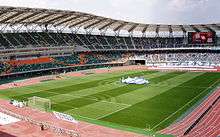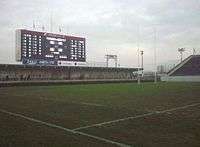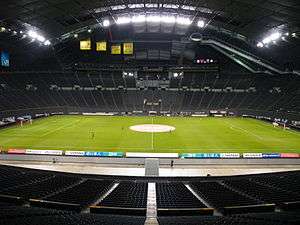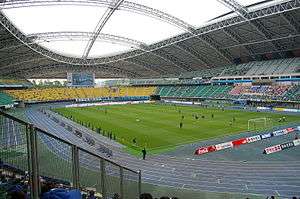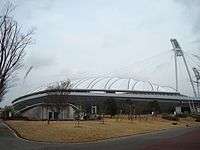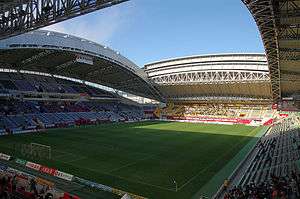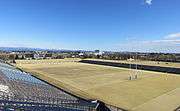2019 Rugby World Cup
| 2019 ラグビーワールドカップ | |
|---|---|
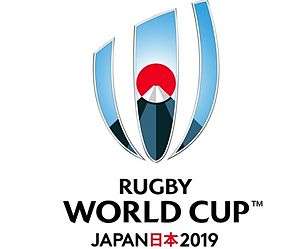 | |
| Tournament details | |
| Host nation |
|
| Dates | 20 September – 2 November |
| No. of nations | 20 |
|
← 2015 2023 → | |
The 2019 Rugby World Cup will be the ninth Rugby World Cup. At a special meeting of the sport's governing body, the International Rugby Board (IRB; known as World Rugby from November 2014), held in Dublin on 28 July 2009, England and Japan were announced as the hosts for the 2015 and 2019 competitions, respectively. This will be the first time the tournament is to be held in Asia, the first time consecutive tournaments have been staged in the same hemisphere, and also the first time that the event will take place outside the traditional heartland of the sport. Hong Kong and Singapore had expressed interest in hosting some of the matches and were included as part of the JRFU's successful original hosting bid to the IRB but were not amongst the fourteen locations announced by organisers Japan 2019 on 5 November 2014 that had formally bid for the right to host games.[1]
The opening match of the 2019 Rugby World Cup will take place at Tokyo Stadium in Chōfu, and the final match will be held at International Stadium Yokohama in Kanagawa. These venue assignments were announced in September 2015 when plans for the tournament were revised by Japan's organizing committee and accepted by World Rugby.[2] The National Olympic Stadium, being rebuilt for the 2020 Summer Olympics, was originally the centerpiece of Japan's Rugby World Cup bid, but revisions to the Olympic Stadium plans mandated the World Cup venue changes.
Bid
The IRB requested that any member unions wishing to host the 2019 or 2015 Rugby World Cup should indicate their interest by 15 August 2008. This would be purely to indicate interest; no details had to be provided at this stage. A record ten unions indicated interest in hosting either the 2015 and/or the 2019 events. The 2019 tournament received interest from nine different nations.
Jamaica were the most surprising union to announce an interest in hosting the event, considering they had never participated in a previous World Cup, though they quickly withdrew. Russia also initially announced plans to bid for both the 2015 and 2019 World Cups, but withdrew both bids in February 2009 in favour of what proved to be a successful bid[3] for the 2013 Rugby World Cup Sevens.[4] Australia withdrew from the bidding process on 6 May 2009.[5]
The three potential hosts - Italy, Japan and South Africa - were announced on 8 May 2009.[6] On 28 July 2009, the International Rugby Board (IRB) confirmed that England would host the 2015 Rugby World Cup, and Japan would host the 2019 event. The IRB voted 16–10 in favour of approving the recommendation from Rugby World Cup Ltd (RWCL) that England and Japan should be named hosts.
Venues
The IRB, RWC Ltd, JRFU and host organisers Japan 2019 went through the process of asking for expressions of interest, and meeting with and explaining game hosting requirements to interested parties from late 2013. In May it was announced that twenty-two municipal and/or prefectural organisations had expressed interest from throughout Japan. Interested organisations were asked to enter a formal bid by the 31st October 2014. At a press conference on the 5th November in Tokyo, organisers Japan 2019 announced that bids from fourteen localities had been received. Secretary-General of the organising committee, Mr. Akira Shimazu advised that amongst the twenty-two interested parties, Yokohama (Yokohama International Stadium, venue for the 2002 FIFA World Cup Final), and Niigata's Denka Big Swan Stadium, which was also a 2002 FIFA World Cup venue had decided not to bid. Shimazu added that the decision of Yokohama not to bid meant that it was virtually a fore-gone conclusion that the new National Stadium in Tokyo would host both the semi-finals, and the third-place playoff in addition to the opening game and final.
There have been a number of changes to the venues submitted in the JRFU's original bid in 2009. Gone are both Hong Kong and Singapore. All games will be in Japan. The JRFU's own Chichibunomiya Stadium in Tokyo which might have been expected to host smaller interest games in the capital is missing. Also the JRFU plumped for the larger, and more modern 50,000 seat Nagai multi-purpose stadium as its preferred venue for games in Osaka in 2009 but the Osaka Municipality and East Osaka City governments have submitted the Hanazono Rugby Stadium which they are planning to refurbish as the Osaka venue option. East Osaka City will take over the stadium from long-time corporate owners Kintetsu in April 2015. Kamaishi, Shizuoka, Kyoto, Oita, Nagasaki, and Kumamoto are all venues that weren't part of the JRFU's bid. While the bids include venues from a broad area of Japan, two parts won't be involved in hosting. Firstly the Hokushin'etsu area (Hokuriku region and Koshin'etsu region), which includes the city of Niigata, and secondly the Chugoku Region, including Hiroshima, and nearby Shikoku Island. No city in the latter region were venues for games in the 2002 FIFA World Cup but Hiroshima did host games in the 2006 Basketball World Championship.
On 17 July 2015, Japanese Prime Minister Shinzo Abe announced that plans to build the new National Stadium would be scrapped and rebid on amid public discontent over the stadium's building costs. As a result, the new stadium would not be ready until the 2020 Summer Olympics.[7] World Rugby released a statement saying that they were extremely disappointed by the announcement "despite repeated assurances to contrary from the Japan Rugby 2019 Organising Committee and Japan Sports Council," and would "need to consider the options relating to the impact of (the) announcement."[8]
In September 2015, World Rugby approved the Japan Rugby 2019 organizing committee's revised roadmap for the 2019 Rugby World Cup, which sought to resolve the venue inadequacies caused by the floundering development of the National Stadium. It was agreed that the originally proposed National Stadium fixtures will be borne by the Ajinomoto Stadium in Chōfu (a suburb of Tokyo), which will host the opening ceremony and opening match, and the Yokohama Stadium, which will host the final. The complete revised list of Rugby World Cup 2019 venues are:[2]
Qualifying

As of 11 October 2015, twelve teams have secured their place in the 2019 tournament, these being the top three teams in each pool during the 2015 Rugby World Cup that gained automatic qualification for the next tournament. Japan finished 3rd in Pool B during the 2015 Rugby World Cup and so finished in a qualifying position - however, by virtue of hosting the tournament, Japan were assured qualification for the tournament before the 2015 Rugby World Cup took place. The remaining eight spaces would be decided by regional slots and cross regional play-offs.
Qualified teams
| Team | Method of Qualification | Region | Past appearances |
Previous best result | World Ranking at start of event |
|---|---|---|---|---|---|
| Host/Automatic Qualification | Asia | 8 | Pool stage | ||
| Automatic Qualification | Africa | 6 | Champions (1995, 2007) | ||
| South America | 8 | Third place (2007) | |||
| Europe | 8 | Champions (2003) | |||
| 8 | Runners-up (1987, 1999, 2011) | ||||
| 4 | Pool stage | ||||
| 8 | Quarter-finals (1987, 1991, 1995, 2003, 2011, 2015) | ||||
| 8 | Pool stage | ||||
| 8 | Fourth place (1991) | ||||
| 8 | Third place (1987) | ||||
| Oceania | 8 | Champions (1991, 1999) | |||
| 8 | Champions (1987, 2011, 2015) | ||||
| TBA | via
regional slots and cross regional play-offs[9] |
Africa | |||
| TBA | Americas | ||||
| TBA | |||||
| TBA | Europe | ||||
| TBA | Oceania | ||||
| TBA | |||||
| TBA | Europe/Oceania | ||||
| TBA | via Repechage | Any |
Notes and references
- ↑ "England will host 2015 World Cup". BBC. 2009-07-28. Retrieved 2009-07-28.
- 1 2 "World Rugby approves revised Japan 2019 hosting roadmap" (Press release). World Rugby. 2015-09-28. Retrieved 2015-09-28.
- ↑ "Russia to host Rugby World Cup Sevens 2013" (Press release). International Rugby Board. 2010-05-12. Retrieved 2012-01-01.
- ↑ "Russia keen to bid for RWC Sevens 2013". International Rugby Board. 2009-02-13. Retrieved 2009-02-15.
- ↑ "Australia withdraws 2019 Cup bid". BBC Sport. 2009-05-06. Archived from the original on 9 May 2009. Retrieved 2009-05-06.
- ↑ "IRB confirms record RWC bid response". International Rugby Board. 2009-05-08. Archived from the original on 11 May 2009. Retrieved 2009-05-09.
- ↑ Himmer, Alastair (17 July 2015). "Japan rips up 2020 Olympic stadium plans to start anew". news.yahoo.com. AFP. Retrieved 17 July 2015.
- ↑ Linden, Julian (17 July 2015). "World Rugby officials seeking answers from Japan". reuters.com. Reuters. Retrieved 17 July 2015.
- ↑ "Regional qualification process set for Rugby World Cup 2019". www.rugbyworldcup.com. Retrieved 2016-01-11.
